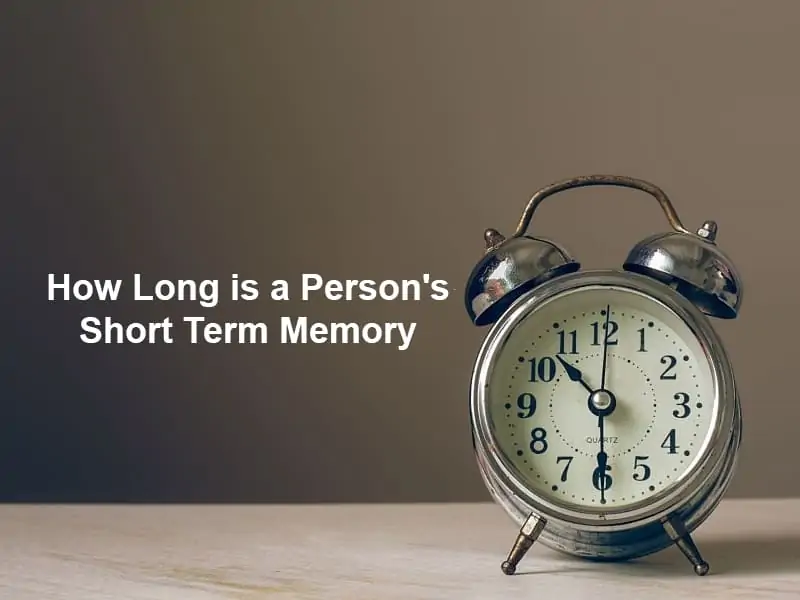Exact Answer: Up to 30 seconds
Human memory is really fascinating, and it can be broadly classified into two categories which are long-term memory and short-term memory. Long-term memory is the one which we use to recall pieces of information in exams and so on while short-term memory is the working memory.
The three major characteristics of short-term memory are limited time and storage, which means that it is only present in the forefront for up to 30 seconds. Even then it is very fragile and only about five to nine elements can be stored in the short-term memory. It is encoded primarily via acoustic where even the visual information is translated to sounds.

How Long is a Person’s Short Term Memory?
Short-term memory is very important as it helps us to perform our day-to-day life activities, for example, this memory helps us to recite or reiterate something we just heard maybe a phone number or any information. This memory lingers on the mind somewhere between 20 to 30 seconds, after which it is either forgotten or changed into long-term memory via repeated rehearsal. It is dependent on the frontal and parietal lobes of the brain and here the information is stored in acoustic code.
There are three operations for which short-term memory is responsible for those are iconic, which is the ability to store images, acoustic, the major one in which the information is stored in acoustic code. Finally is the working memory though it is more used interchangeably with short-term memory, however, they are not the same. And what is even more fascinating with working memory is that it is flexible, dynamic, and can be changed into long-term memory with various practices, while with short-term we can only storage pieces of information with no manipulation.
In Summary:
| Features | Short-term Memory |
| Persistence | Very brief, up tp thirty seconds. |
| Access | Immediate |
| Capacity | Limited, we can only recall seven items(Miller’s Law) |
| Input | Very fast |
Why is the Short Term Memory short-lived?
To understand why short-term memory is called so we will first have to understand how memory is stored in our brains. There are three areas of the brain where memory is stored, which are the hippocampus, the neocortex, and the amygdala. Short-term memory is stored in the prefrontal cortex, which is a part of the neocortex. Using advanced science and technologies like magnetic resonance imaging(MRI) we have found out that when people perform a task that requires short-term memory the prefrontal cortex becomes active in our brains.
Not only that there is a clear distinction in the functioning of the left and right parts of the prefrontal cortex. The left part is responsible for verbal working memory and the right part is responsible for spatial working memory. Another part of the brain which is essential for good memory is the hippocampus, it is required for changing a short-term memory to long-term memory.
Now, since short-term memory is low in persistence and capacity, there are methods of changing short-term memory to long-term memory. These methods include the Atkinson-Shiffrin Model is the classical method which states that short-term memory is changed into long-term memory after a certain duration of time. Chunking is another method that is basically memorizing certain pieces of information and then there is the rehearsal method. The most fun is the exercise method, where physical exercises can help one to remember things and recall them better.
Short-term memory is very crucial for a healthy and content life, and diseases and injuries can alter the capacity and persistence of the short-term memory. Short-term memory loss is one such condition in which a person cannot recall what they do, hear or say just recently, which causes hindrance in their daily life.
Conclusion
In conclusion, we can say that short-term memory is important for our daily activities and routines. The time period of up to approximately thirty seconds is the standard in humans and when that changes it can be an indication for any underlying conditions or disease. It can not only be short-term memory loss, but also other conditions like dementia, Parkinson’s, or even Alzheimer’s. Thus it is important to have a healthy lifestyle, with exercise and no addition to substances as all these can cause harm to various parts of the brain.